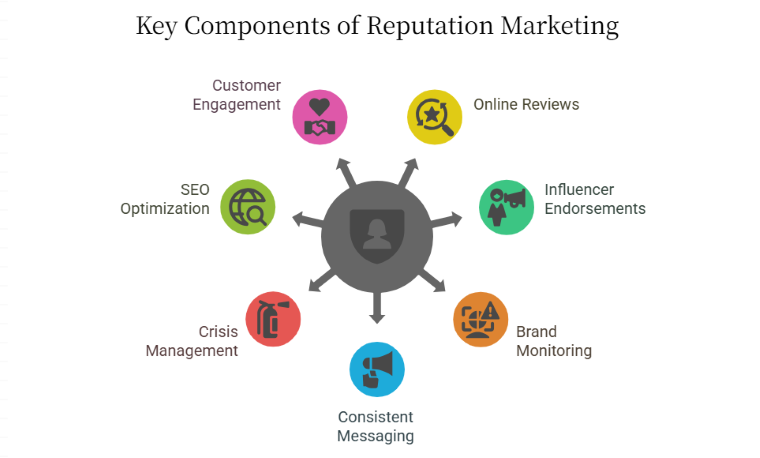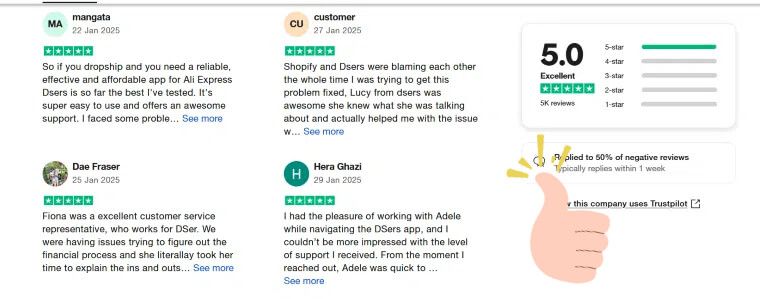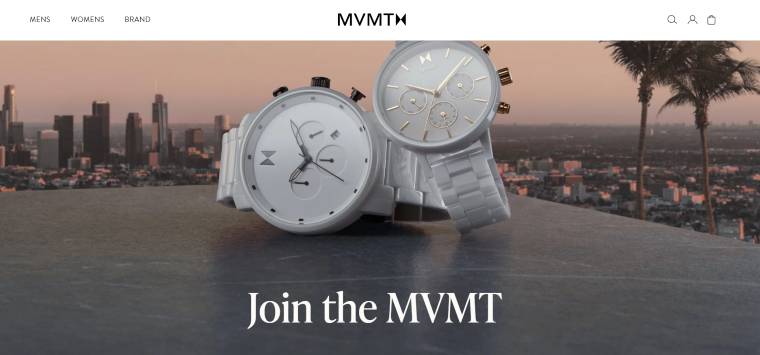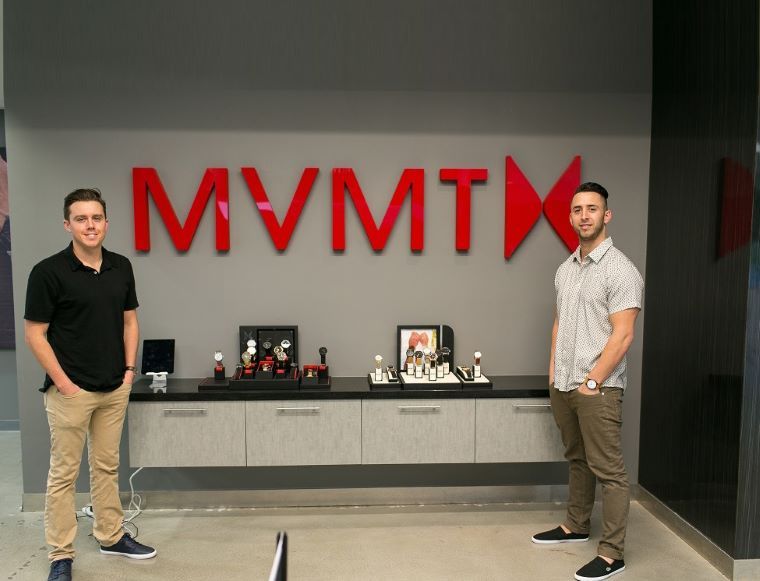What Is Reputation Marketing in 2025: An Ultimate Guide For Business
Last updated: July 3, 2025

In today’s digital era, your business’s success hinges on maintaining a stellar online presence. Reputation marketing is a dynamic tactic that molds public opinion, fosters trust, and fuels customer acquisition and growth.
But how does it work, and how can your brand harness its potential? This ultmate guide explores the essentials of reputation marketing and why it’s a game-changer for your brand’s success.
What Is Reputation Marketing
Reputation Marketing is a deliberate effort to boost a company’s trustworthiness and exposure. According to Wikipedia, it refers to the real-time evaluation of a brand's reputation through consumer-generated content like online reviews and social media posts sharing personal experiences.

|
Manage Multiple Stores In One Account Multiple Stores Management - Link and manage multiple stores on different platforms in one place |
Unlike traditional marketing, which primarily aims to promote products or services, reputation marketing emphasizes building trust and authority in the marketplace. This is achieved through online reviews, testimonials, social media mentions, and community engagement.
A strong reputation not only attracts new customers but also increases customer loyalty, driving long-term business growth. Consumers often rely on online reviews before making purchasing decisions, mastering reputation marketing has become essential for businesses aiming to stand out in competitive markets.
Key Components of Reputation Marketing
Reputation Marketing is a powerful strategy that shapes how customers perceive your brand. In today’s digital world, a strong reputation can drive trust, loyalty, and revenue.

But what exactly makes up an effective Reputation Marketing strategy? Let’s break down the key components that help businesses build and maintain a stellar reputation.
1. Online Reviews and Testimonials Management
Customer reviews are the backbone of Reputation Marketing. Positive feedback on platforms like Google, Yelp, and Trustpilot builds credibility, while negative reviews offer opportunities for improvement. Encouraging satisfied customers to leave reviews and professionally addressing complaints can significantly boost your brand’s trustworthiness.

2. Social Proof via Influencer Endorsements
Consumers place greater faith in authentic user feedback and influencer endorsements than in conventional advertising. Showcasing user-generated content, case studies, and influencer partnerships reinforces your brand’s reliability.
Social platforms such as Instagram, TikTok, and LinkedIn offer prime opportunities to showcase credibility through peer validation.
3. Brand Monitoring and Sentiment Analysis
Monitoring brand sentiment in real time is essential for maintaining a positive image. Tools like Google Alerts, Mention, and Brandwatch help monitor online conversations.
Sentiment analysis allows you to gauge public perception and respond proactively to both praise and criticism.
4. Consistent Brand Messaging Strategy
A cohesive brand voice across all channels—website, social media, emails, and ads—strengthens trust. Inconsistent messaging can confuse customers and weaken credibility. Ensure your brand values, tone, and visuals align in every interaction.
5. Crisis Management and Response Planning
No brand is immune to negative publicity. Having a crisis response strategy in place ensures swift damage control when issues arise. Quick, transparent, and empathetic responses to PR issues can turn a potential reputation disaster into a trust-building opportunity.
6. SEO and Online Visibility Optimization
A strong online presence ensures your brand’s positive attributes rank higher in search results. Optimizing content with relevant keywords (like "Reputation Marketing"), earning backlinks, and maintaining an active blog contribute to better visibility and authority.
7. Customer Engagement and Community Building
Engaging with your audience fosters loyalty. Responding to comments, hosting Q&A sessions, and creating valuable content (like tutorials or thought leadership articles) make customers feel valued. A loyal community naturally advocates for your brand.
Reputation Marketing isn’t just about damage control—it’s about proactively shaping how the world sees your brand. By prioritizing these elements, companies can cultivate loyalty, expand their customer base, and achieve sustainable growth.
Why Reputation Marketing Is Crucial for Businesses
In our digitally driven world, maintaining a strong online reputation has shifted from being optional to absolutely essential for business success. It plays a pivotal role in shaping purchasing behavior, SEO performance, market positioning, and how a brand is perceived.

|
Manage Multiple Stores In One Account Multiple Stores Management - Link and manage multiple stores on different platforms in one place |
Let’s delve into why reputation marketing isn't just a luxury but a necessity for businesses aiming to thrive in today’s competitive landscape.
1. Shape Consumer Decisions
Drawing from the Cognitive Dissonance Theory, a good brand reputation can make consumers more tolerant of product or service flaws and more likely to recommend the brand, while a poor reputation has the opposite effect. Compelling, data-driven evidence further underscores the profound influence brand reputation wields over consumer behavior, revealing just how pivotal it is in shaping purchasing decisions and long-term brand loyalty.
- 93% of shoppers consult reviews before buying, with 84% valuing them equally to recommendations from friends or family (BrightLocal)
- Glowing reviews can boost sales by up to 270% (Spiegel Research Center)
- Negative feedback can deter 94% of potential customers (ReviewTrackers)
- 83% of consumers consider a brand’s reputation as a crucial factor when making purchasing decisions (Accenture)
- Globally, about 70% of consumers are willing to pay a premium for products or services from brands with an excellent reputation (Statista)
2. Boost Search Rankings
Google's algorithms are sophisticated systems that place significant emphasis on trust signals, with reviews, ratings, and brand authority being among the key ranking factors. Brands with an average rating of 4 stars or above see a 60% surge in click-through rates for local search queries.
The quantity and quality of reviews play a pivotal role in influencing local pack rankings and organic visibility. More reviews not only signal to search engines that a business is active and relevant but also provide valuable content that can be indexed.
In essence, reputation marketing serves as the fuel for SEO in the long run. By consistently cultivating a positive brand reputation through excellent customer experiences and encouraging reviews, businesses can ensure their long-term discoverability. As search engines continue to evolve to deliver the most relevant and trustworthy results to users, a strong reputation becomes an invaluable asset for climbing the search rankings ladder and staying visible to potential customers.
3. Sharpen Competitive Edge
In crowded markets where products and services often appear interchangeable, Reputation Marketing becomes the decisive factor that separates industry leaders from forgotten competitors. Research by PowerReviews reveals that businesses actively curating their online feedback enjoy 41% higher purchase intent from potential customers.
To dominate your niche, monitor competitor reputations using tools like SEMrush or Review Trackers. Analyze where competitors fall short in addressing customer feedback or maintaining high ratings, then highlight how your brand delivers superior solutions. Whether it’s faster reply times, more detailed resolutions, or showcasing positive testimonials in ads, Reputation Marketing turns visibility into preference and preference into market share.
4. Define Brand Perception
Your brand’s reputation isn’t just about mitigating damage—it’s the foundation of emotional loyalty and premium positioning. Research indicates that companies with strong reputations tend to have significantly higher customer lifetime value, proving that trust directly impacts profitability.
Reputation Marketing shapes this narrative at every touchpoint:
- Customer ratings and public reviews serve as a visible measure of your business's trustworthiness.
- Social media conversations amplify your brand’s personality (or expose its flaws).
- News mentions and influencer coverage cement authority—or trigger crises.
Practical Tips: How to Kickstart Your Reputation Marketing Strategy
To make reputation marketing truly effective, theory alone is not enough. Here are some actionable steps to help you quickly build and maintain a strong brand reputation:
1. Actively Request Customer Reviews
After purchase, invite satisfied customers via email or SMS to leave honest reviews. Keep the process simple and user-friendly to encourage more feedback.
2. Use Review Management Tools
Utilize platforms like Trustpilot, Yotpo, and Google My Business to centralize customer feedback, monitor new reviews in real time, and respond promptly to negative comments.
3. Regularly Monitor Brand Mentions
Set up alerts with tools like Google Alerts and Mention to stay informed of customer mentions, media coverage, and competitor activities.
4. Build a Social Media Engagement Routine
Don’t just post content—actively respond to comments, direct messages, and questions to humanize your brand and build trust.
5. Prepare Crisis Response Plans
Develop clear processes to handle negative feedback and PR crises, ensuring quick, transparent, and empathetic communication when issues arise.
6. Encourage User-Generated Content (UGC)
Run contests, giveaways, or offer discounts to motivate customers to share videos or photos of your products, boosting authentic social proof.
By consistently applying these practical steps, your reputation marketing will create a strong trust barrier that supports sustainable brand growth.
Case Study: How MVMT Watches Used Reputation Marketing to Build a $300M Brand
MVMT Watches, founded in 2013, serves as a prime example of how reputation marketing can catapult a brand from obscurity to global recognition. Starting as a dropshipping startup, the brand harnessed the power of strategic reputation-building initiatives to become a force in the watch industry.

Key Strategies:
- Influencer Collabs
Instead of investing heavily in A-list endorsements, MVMT Watches tapped into the influence of niche content creators.These influencers, with their smaller but highly engaged followings, offered an authentic form of social proof. By partnering with them, MVMT was able to reach niche audiences that were more likely to resonate with the brand's message, creating a sense of trust and credibility among consumers.
- User-Generated Content
The #MVMTWatches campaign was a game-changer. It empowered customers to become brand promoters, sharing their experiences and photos of the watches on social media. This user-generated content not only provided free marketing but also served as genuine testimonials, showcasing real people enjoying the product. It built a community around the brand, making customers feel involved and valued.
- Brand Storytelling
MVMT Watches positioned itself as more than just a watch brand; it was a minimalist, anti-luxury watch movement. By crafting a compelling brand story that emphasized simplicity, affordability, and a break from traditional luxury norms, they carved out a unique identity in the market. This story resonated with a wide audience, attracting those seeking something different and meaningful.
- Social Responsibility
In an era where consumers increasingly prioritize ethical and sustainable brands, MVMT Watches' decision to donate portions of sales to charity was a brilliant move. It not only made a positive impact on society but also enhanced the brand's reputation, portraying it as one that cares about more than just profits.
These reputation marketing strategies yielded remarkable results. With over 1.5 million satisfied customers, MVMT Watches demonstrates the power of cultivating genuine audience relationships. The brand achieved an impressive $300 million in revenue, a clear indication of the effectiveness of its reputation-driven approach. In 2018, it was acquired by the Movado Group, further validating its success and the value of its reputation in the market.

MVMT Watches' $300M success is a resounding endorsement of the power of reputation marketing.Their focus on real connections, user validation, and compelling narratives helped them earn widespread consumer confidence. In today's competitive business landscape, where consumers are more discerning than ever, investing in your reputation is not just an option—it's a necessity for sustainable growth.
Future Trends in Reputation Marketing
Reputation marketing is evolving rapidly as consumer behaviors and digital technologies change. Brands that stay ahead of these trends will build stronger trust, loyalty, and competitive advantage. Here are the key future trends shaping reputation marketing:
1. AI-Powered Reputation Management
- Chatbots & Sentiment Analysis: AI will analyze customer reviews, social media mentions, and feedback in real-time to identify reputation risks and opportunities.
- Personalized Responses: Brands will use AI to craft tailored responses to customer complaints and praise, improving engagement.
- Predictive Analytics: AI will forecast reputation crises before they happen, allowing proactive damage control.
2. Micro-Influencers & Nano-Influencers Take Over
- Consumers increasingly distrust mega-influencers and traditional ads.
- Brands will partner with micro (10K-100K followers) and nano-influencers (<10K followers) for more authentic, relatable endorsements.
- Example: A local fitness coach promoting activewear will drive more trust than a celebrity with paid sponsorships.
3. Video & Live Social Proof Dominates
- Short-form video reviews (TikTok, Instagram Reels, YouTube Shorts)** will replace text-based testimonials.
- Live unboxings and real-time product testing will become standard for e-commerce brands.
- User-generated video content (UGC) will be prioritized over polished ads.
4. Blockchain for Transparent Reviews
- Fake reviews and paid testimonials are eroding consumer trust.
- Blockchain-based verification will ensure reviews are authentic and untampered.
- Consumers will be able to track a product’s entire review history to confirm legitimacy.
5. Employee Advocacy as Brand Reputation Boosters
- Employees will become key reputation drivers through:
- LinkedIn thought leadership
- Behind-the-scenes company culture content
- Authentic "day in the life" social media posts
- Brands like Zappos and HubSpot already excel at this.
6. Voice Search & Reputation Optimization
- As voice assistants (Alexa, Siri, Google Assistant) grow, brands must optimize for
- Conversational, FAQ-style reputation content
- Local SEO for “near me” searches
- Featured snippets for positive brand mentions
7. Sustainability & Ethical Branding as Reputation Drivers
- Consumers (especially Gen Z) favor brands with genuine sustainability efforts.
- Greenwashing backlash will force brands to be transparent about ESG (Environmental, Social, Governance) efforts.
- Example: Patagonia’s “Don’t Buy This Jacket” campaign strengthened its ethical reputation.
Frequently Asked Questions
Conclusion
In conclusion, reputation marketing is no longer a luxury but a necessity for businesses aiming to thrive in the digital age. By understanding its core components, leveraging its benefits, learning from successful case studies like MVMT Watches, and staying ahead of emerging trends, brands can build a solid reputation that fosters trust, drives growth, and ensures long-term success in an increasingly competitive marketplace.









 Company
Company
 Why Choose DSers
Why Choose DSers
 Blog
Blog
 Help Center
Help Center




 Live Chat
Live Chat